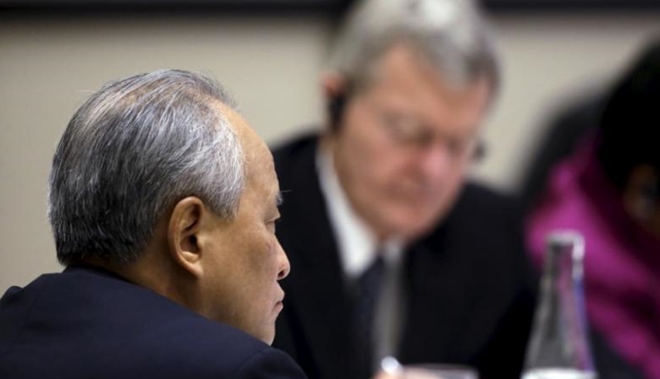Chinese ambassador to U.S.: Sovereignty not a 'bargaining chip'
- After Trump's win, China and Mexico move to deepen ties
- US Sanctions Against China Over the East Sea and East China Sea
- Trump fills homeland security, environment, China ambassador jobs
- China's Gleaming Automotive Future, Teased at Guangzhou Auto Show
Ambassador Cui Tiankai, speaking to executives of top U.S. companies, said China and the United States needed to work to strengthen their relationship.
"The political foundation of China-U.S. relations should not be undermined. It should be preserved," Cui said.
 |
| China's Ambassador to the U.S. Cui Tiankai (L), listens as U.S. Ambassador to China Max Baucus takes notes while Chinese President Xi Jinping speaks at a U.S.-China business roundtable, comprised of U.S. and Chinese CEOs in Seattle, Washington September 23, 2015. REUTERS/Elaine Thompson/Pool |
"And basic norms of international relations should be observed, not ignored, certainly not be seen as something you can trade off," he said. "And indeed, national sovereignty and territorial integrity are not bargaining chips. Absolutely not. I hope everybody would understand that."
Cui's remarks were in line with recent protests from China's Foreign Ministry, which regards the "one China" principle as the "political basis" for U.S.-China ties.
Beijing regards Taiwan as a renegade province and has vowed to use military force to bring it under mainland rule if the island were to formally declare independence.
Trump, in an interview on "Fox News Sunday," suggested that the U.S. position on Taiwan could become part of his pledge to negotiate more favorable trade terms with China.
"I fully understand the 'one China' policy, but I don't know why we have to be bound by a 'one China' policy unless we make a deal with China having to do with other things, including trade," Trump said.
U.S. corporate executives are increasingly pessimistic about their business prospects in China in light of tough restrictions on foreign investment in the country's vast service sector, new cyber-security regulations that favor domestic technologies and weak enforcement of intellectual property protections.
Earlier on Wednesday, news that Chinese officials may penalize a U.S. automaker for monopolistic pricing behavior pushed down shares of General Motors Co (GM.N) and Ford Motor Co (F.N).

